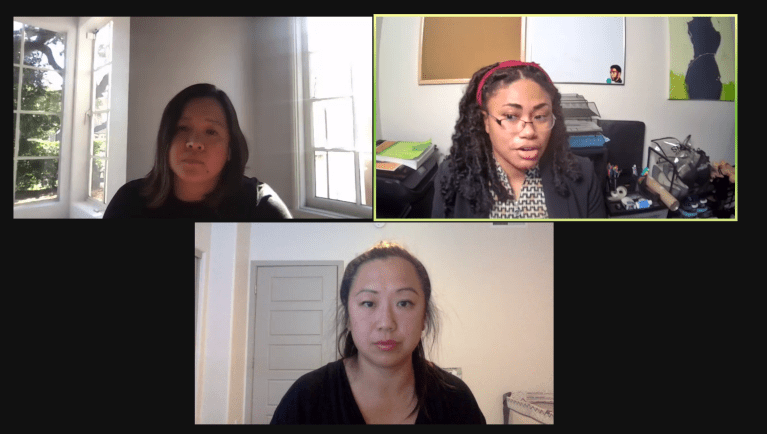Stereotypes of Asian American women — especially those who work at massage parlours — have fueled their fetishiziation and poor treatment by the police, said panelists at a Monday event hosted by the Clayman Institute for Gender Research.
The event follows a mass-shooting on March 16 in Atlanta where a gunman killed eight individuals — six of whom were Asian women. The violence added fuel to a national conversation about racially motivated hate in the United States against Asians, especially those who are women or low-income.
Nearly 3,800 hate incidents targeting Asian-Americans were reported nationwide since last March by Stop AAPI Hate, a national group that logs such events.
“[The shooting] was the most visible act of anti-Asian violence that we’ve seen in a long time and quite readily people took up this banner of stop Asian hate,” said moderator Melissa Brown, a postdoctoral fellow at the Clayman Institute.
At the talk, Brown University American and ethnic studies professor Elena Shih and University of California, Los Angeles Asian-American studies and social welfare professor Lee Ann Wang discussed the intersection between anti-Asian violence and gender.
The Atlanta gunman said that his actions were not racially motivated, but were rather due to his sexual addiction. Shih and Wang said their research supports that the shootings could have been motivated by such an addiction, but that motivation does not exonerate the gunman of a racial motive but in fact reinforces it: the fetisization of Asian women feeds into why Asian women can be readily seen as objects for a sex addiction.
Shih said massage parlors and sex work are a common source of work within immigrant communities as sex work is a readily available form of low-wage service sector work that doesn’t require English profiency.
Many workers in massage parlors do not engage in sex work, and none of the victims of the shooting are known to have engaged in sex work. Shih said that many individuals she interviewed in Providence and Flushing referred to their work as massage worker rather than claiming the term sex worker.
“Not all people, even if they are doing different kinds of sex work, use that language of sex work,” Shih said, attributing that to cultural differences in how sex work is legally and coloquailly defined in Chinese and Korean cultures.
Work in a massage parlor can also make individuals subject to more intense policing: No matter how the workers in massage parlors choose to classify themselves, the parlors remain the subject of intense policy scrunitiny because of their proximity to sex trafficking, according to Shih. (Since some massage parlors employ individuals who are victims of sex trafficking, police often keep watch on these businesses.)
“Police often descend on the [job] that is closest to sex and the closer the proximity to sex the more this interferes with the lives of immigrants,” Shih said.
This is compounded by how Asian massage businesses are also frequently the target of law enforcement in other areas, as building code and eviction notices are also commonly used to displace Asian migrant massage businesses, said Shih.
And when massage businesses are approached by police, how police handle the situations are often influenced by stereotypes, according to Shih.
“It became slightly unpopular to arrest Asian women who are deemed to be victims of sex trafficking,” Shih said. “Asian women are seen as perfect and ideal victims in ways that their Black and Latinx counterparts are not.”
In the same vein, Wang shared an anecdote from an attorney working with an Asian woman who was applying for a visa in the United States and had previously violence in her workplace. While her attorney recommended she speak about the negative ramifications of the experience, the woman wanted to focus on how she escaped unharmed, adding that the “‘more innocent and clean I present myself the more they’ll want to help me,’” Wang recounted.
Wang said she found it remarkable that someone who had limited English skills and did not know much about the American legal system knew about the stereotype she felt she had to play into: the “quivering victim.”
Shih and Wang added that the shooting is a chance for individuals across the country to continue having tough conversations about race, and for individuals to consider where they make change in their communities.
“We need to have conversations across communities, but also the difficult conversations within our own communities, the way we see ourselves, and the communities we are not a part of,” Wang said.
